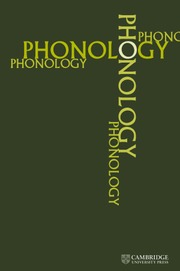Iggy Roca (ed.) (1997). Derivations and constraints in phonology. Oxford: Clarendon Press. Pp. xii+601.
Published online by Cambridge University Press: 21 November 2002
Abstract
In Optimality Theory (OT), a grammar is a language-particular ranking of universal constraints (Prince & Smolensky 1993).This work was supported by the National Science Foundation under grant SBR- 9420424. I am grateful for comments received from Juliette Blevins, Mike Hammond, Paul de Lacy, Ania Łubowicz, Alan Prince, Doug Pulleyblank, Iggy Roca, Nick Sherrard and Jen Smith. Of course, I alone am responsible for the contents of this review. There are two types of constraints: markedness constraints prohibit (or require) certain output configurations; and faithfulness constraints demand identity in input → output mappings. Phonological generalisations are expressed by the interaction, through ranking, of these constraints.
In classical generative phonology (CGP), a grammar is a language-particular ordering of rules (Chomsky & Halle 1968). Though the rules are also language- particular, they are constructed using universal abbreviatory devices subject to an evaluation metric. Phonological generalisations are expressed by the rules and their ordering.
- Type
- Review
- Information
- Copyright
- © 1999 Cambridge University Press
- 1
- Cited by




